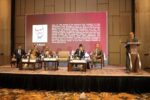The milieu of the Local Government: Decentralization policies are usually changed by the government with an objective in mind to create political loyalty, and to build a strong political base at the local level by putting party men in various positions.
Furthermore, before formulating decentralization initiatives, public opinion is rarely ever solicited. Local Government (LG) leaders in Bangladesh are not fully empowered to carry out their work. Management systems are typically weak and broad-based while community participation in LG decision-making is usually limited.
LG is one of the most important but sensitive items in policy- and budget-making arenas. Most of Bangladesh’s local governments are highly dependent on a historically centralized national government system.
Interestingly, less than one percent of Bangladesh’s GDP funds 85 percent of LG development expenditures.
Undeniably, LG bodies are heavily dependent on direct grants from the central government and shared tax revenue with the land department.
In the era of the modern state, the prominence of the Local government has been indispensable to lessen the burden of the central government in service delivery.
Local government bodies in every administrative unit of the republic are the major actors in the field of local development works.
Local government is a fertile ground for democracy. Indeed, democracy works when all people including the most marginalized ones participate in the process of governance can ask questions and can seek accountability.
LG is an integral part of the central government of Bangladesh. In Bangladesh, the central government exploits the strength of the local government for realizing their political agenda.
One important way of strengthening democratic institutions without weakening the executive is to make maximum use of committees.
Strengthening local government is an essential element of effective democracy, and effective democracy is a pre-requisite for ensuring good governance.
Indeed, democracy works when all people including the most marginalized ones participate in the process of governance, can ask questions, and seek accountability.
The Upazila Parishad is midway between local and central government, and it’s an important tier of political-administrative nexus. More importantly, to carry out government programs, Upazila provides a bridge between local and national government.
Local Government Nexus Rural Development
The local government institutions have the potential to emerge as strong agents of development that can reach out to the local communities and help them identify and plan their own needs.
Unfortunately, administrative officials working at the local government bodies level are bureaucratic and alienated from the people, and therefore, people cannot properly take part in different activities of LG.
The weakness of its socio-economic base remains a key obstacle in the way of democratic education through LG.
The unequal economic structure trends to influence the local bodies by pro-partied class. They often tend to suit their class interest and purposes.
Interference of MP over the local government bodies determines the providence of local development planning where local elected representatives have no stake in truth.
As a result, LG cannot render proper services to the people at the local level. Besides, the presence of the local elite dissuades the general public from participating in the LG, which results in a less effective local government.
MP in Local Government: Constitutional Obligation
Representative role of Member of Parliament (MP) could be spelled in three dimensions: a) political representation, b) representation of social diversity and c) constituency of representation. Constituency representation is explored with a particular focus on parliamentarians’ involvement in local development work through local government bodies.
Local government bodies in every administrative unit of the republic are the major actors in the field of local development works.
What the parliament can do for local governments is also defined in our constitution. As stated by article 60 of the constitution, “Parliament shall, by law, confer powers on the local government bodies, including the power to impose taxes for local purposes, to prepare their budgets and to maintain funds.”
Article 25 of the Upazila Parishad Act 2009 keeps the provision for MP’s role in the Upazila Parishad as Adviser.
According to this article, Upazila Parishad will have to take the advice or shall accept the advice of the MP concerned, who is neither elected to the Upazila Parishad nor has any voting right in it.
Again, article 42 (3) of the Upazila Parishad Act 2009 allows the Parishad to plan local development in consultation with the local MP.
As Adviser, MPs should monitor different activities of the local government bodies from a distance, just to ensure that they follow the parliament-adopted policies.
Furthermore, the provision of constituency services by the MPs, through control and partisan distribution of public resources aggravates the probability of corruption and conflict of interest.
Does MP influence Upazila Parishad?
As stipulated in the Upazila Parishad Act 2009, MP’s role as adviser to the local government bodies is not ideally conflicting as long as MP is watchful for accelerating the wellbeing of the people in his/her constituency.
However, the reality suggests that the ‘advice’ of MPs turns into an ‘executive order’, letting them override and control the development planning and actions by the elected representatives at the Upazila Parishad.
Advisory role of MP signposts where does the decision-making power lie and literally triumph for political representatives to interfere decision-making process for rural development activities without asking the locally elected representatives.
Furthermore, to make the development truly meaningful, standing committees are to be made effective involving people directly in the formulation and implementation of decisions.
In many cases, MP nominates his/her party man in the selection committees and beneficiary lists of social safety net program respectively making sure the beneficiaries of food for work, vulnerable group feeding (VGF), test relief, and old-age allowance come from the followers of political party MP belongs to.
Committee of the Upazila Parishad is perceived as an important apparatus to make the Upazila Parishad accountable for its actions.
MP could nominate a representative to these committees ensuring his/her representation to the discussion, decision and development planning.
MP’s representative always tries to impose the liking of MP in the decision-making process of the committee.
MP’s advisory role is awfully absent which results in futility of the committee system at Upazila Parishad.
Interference of MP over the local government bodies determines the providence of local development planning where local elected representatives have no stake in truth.
MP’s unyielding non-cooperation and undue influence hurdle local government to turn into an effective body. Worry of losing MPs supremacy in their respective constituencies stop them to cooperate instead of interfere at last.
The success of the Upazila scheme largely depends on how best the local leadership, MP and the people inter-act in an environment of cooperation and partnership.
MP’s interference indulges the noble attempts of UZP for delivering better services in many cases.
In quest of trustworthy working relations
To overcome the development paradox centering the apparent power scuffle between MP and Upazila Parishad Chairman, a culture of accountability is must and has to be created by political party in power.
Cooperation among MP, local government bodies and the local administration will trigger equitable development in the rural areas of Bangladesh.
While decentralization is a significant catalyst for sustainable development in the rural Bangladesh, the prevailing servant-master relationships between MPs and bureaucrats and local elected representatives to be wiped out fostering mutual understanding with fairness in decision making process.
MPs must bear in mind they are elected by the people of their constituencies and could be unseated in the next election if they fail to look after common interests of them.
Therefore, a strong political will is required for the effectiveness of LG as a democratic body in a true sense.
MP must work together with the LG representatives to make the development really meaningful by the way of empowering and sustaining the ‘bottom–up’ approach of development.
MP must act as bridge between the local administration and the local government involving people directly in the making and implementation of decisions of UZP.
Furthermore, to make the development truly meaningful, standing committees are to be made effective involving people directly in the formulation and implementation of decisions.
This necessitates the decentralization of democracy to the lowest level. Let MP, political parties and relevant stakeholders including community people take the lessons from the problems and overcome them for the greater interest of the nation.
Cooperation among MP, local government bodies and the local administration will trigger equitable development in the rural areas of Bangladesh.
(Dr. Mohammad Tarikul Islam is an Associate Professor of the Department of Government and Politics at Jahangirnagar University in Bangladesh. He is the Visiting Scholar of Oxford and Cambridge. Prior to joining university, Dr. Islam was serving the United Nations for seven years. As a popular development columnist in South Asia, Professor Islam writes for the Khabarhub, the Daily Star, the Daily Independent, the Financial Express, The Business Time, Daily Jugantor and South Asia Monitor regularly)









Comment